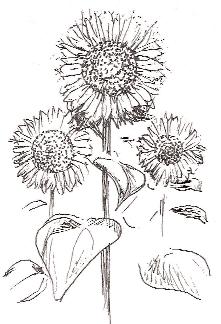
3 minute read
Chapter IV
VEGETATIVE & SENSITIVE POWERS (Part I)
Introduction
In the last chapter we looked at the soul as being the first principle of a living body. In other words, the soul is what makes a thing to be alive. We also said that the soul is the substantial form of the body. As a substantial form, the soul makes a living thing to be the kind of thing that it is. This means that it is the plant soul that makes my flower a plant; the animal soul that makes Snarles an animal; and the human soul that makes you a human being.
What we would like to do in this chapter is to begin focusing in more detail on the human soul, looking specifically at what it can do The human soul can do a great many things, though. So we will focus in this chapter and the next on what we have in common with lower forms of life -- with the plants and animals.
Vocabulary vegetativerational phantasm sensitive internal sensespercept
Powers Ofthe Soul
When St. Thomas speaks about what a thing can do, he uses the term "power" or "faculty." Thus, he refers to the powers or faculties of the human soul when he is speaking about the soul's ability to do something.
How do we know what powers a soul has, since we cannot see souls, let alone their powers? Remember what we learned in the last chapter: the soul expresses itself through its body. So, the first way we know what faculties a soul has is to look at what we see its body doing. For example, if we know that a body can digest food, then we conclude that its soul has the power to nourish itself. Once we know the faculties of a soul, then we know something about what kind of a being it is, its nature. The following diagram might help to clarify this:
Faculty -from the Latin facere, “to make;” a power of the soul that produces certain operations.
Introspection - from the Latin intro, “inwardly, within, into,” and specere,“to look.” It refers to the practice of looking into -- giving mental attention to -- one's mental states and functions in an attempt to describe, study, or enjoy them.
The second way we can know the faculties of the human soul is by looking within ourselves, through a process called introspection. Through introspection, the human soul can actually "see" itself at work.
Using these two methods:
looking at the activities of the body and
the process of introspection,
St. Thomas identifies the human soul as the source for three main kinds of activities: vegetative, sensitive and rational. This is why he speaks of the soul's vegetative powers, its sensitive powers and its rational powers. These powers account for the soul's many and varied activities, as we'll soon see.
Before we look at the powers themselves, however, it is important to clarify one other thing. We call the souls of plants "vegetative souls" because they have only the vegetative powers. The souls of nonhuman animals have both vegetative and sensitive powers. We refer to their souls as "sensitive souls" because the sensitive powers are the highest ones they possess. This term "sensitive" comes from the fact that the soul of an animal has one or more of the fives senses. Plants can't sense anything. Atree does not wince in pain or even say, "Ouch!" when we tear off a leaf. But animals can feel pain.
The soul of a human being possesses both the vegetative and the sensitive powers. But it has two more powers in addition to these.
Kind of Being Kind of Soul Powers of the Soul
Vegetative - refers to the powers of the soul which enable it to grow, nourish itself, and reproduce. The souls of plants have only these powers.

Every human soul has an intellect and a free will. It is because of these two rational powers that we call the soul of a human being a “rational soul.”
Be careful not to make the mistake of thinking the human being has three souls because it has these three kinds of powers. If it had three souls, then it would be three kinds of beings. It would lack the unity required to be the one being which it is. The human person has only one soul, but his one rational soul has a greater variety of powers than do plant or animal souls. Animal souls have more powers than plant souls. This is precisely why we speak about higher or lower life forms. The more powers a soul has, the higher is its form of life.
The chart on the next page gives you the "big picture" regarding the soul and its powers. Having a look at "the big picture" now will be a help as we progress in considering the powers of the human soul.
Sensitive - refers to the powers of the soul which enable it to receive and react to sensations. All animals have the sensitive powers of the soul as well as the vegetative powers.
Rational - from the Latin ratio, “reason.” It refers to the human way of thinking because our minds move in a step-by-step fashion from understanding one idea to understanding another one, to understanding a third. It is as if we come to knowledge in "piecemeal" fashion. Sometimes the word "rational" is used interchangeably with "intellectual," but strictly speaking they have different meanings.
Rational Powers




